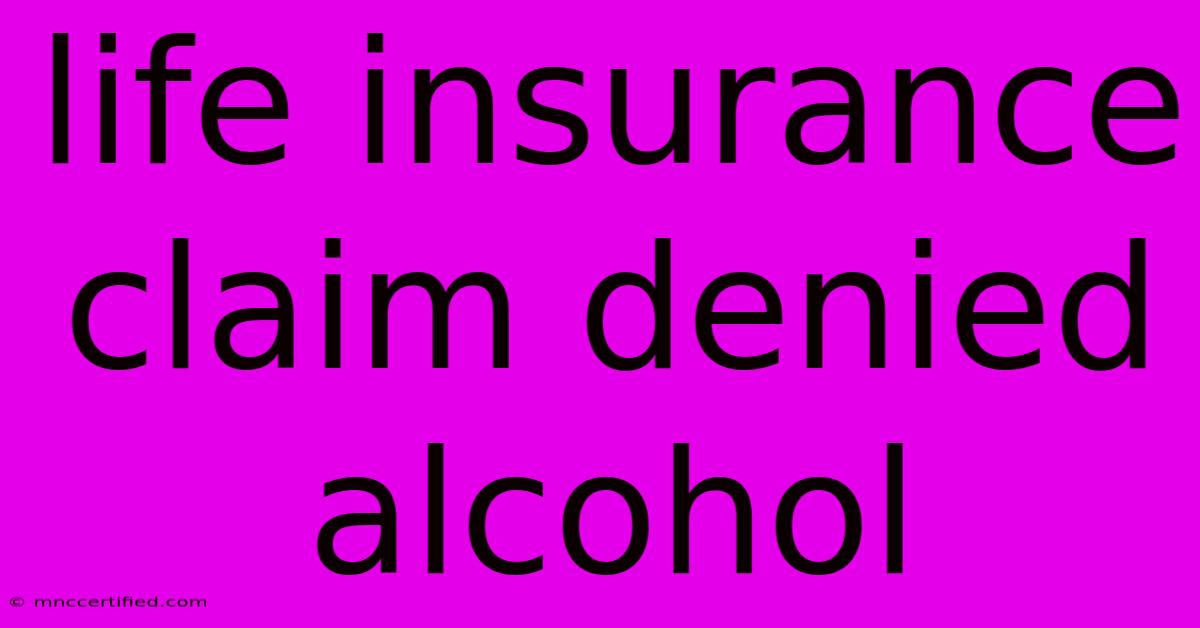Life Insurance Claim Denied Alcohol

Table of Contents
Life Insurance Claim Denied: Understanding the Alcohol Factor
Life insurance is designed to provide financial security for your loved ones in the event of your passing. However, there are instances where a claim can be denied, and alcohol consumption can be a significant factor. It's important to understand the reasons why an insurance company might deny a claim related to alcohol and what steps you can take to avoid potential issues.
Understanding the Terms of Your Policy
The most crucial step is to meticulously review your life insurance policy. It outlines the specific circumstances under which your coverage might be affected. Pay close attention to the following:
- Exclusions: Many policies exclude coverage for deaths related to alcohol-related illnesses or accidents. This could include deaths from cirrhosis of the liver, alcohol poisoning, or fatal accidents while intoxicated.
- Misrepresentation: If you misrepresented your alcohol consumption habits during the application process, your claim could be denied. Insurance companies typically ask about your drinking habits, and lying about your usage can be considered fraud.
- Contestability Period: During the contestability period (usually 2 years), the insurance company has the right to investigate your claim and potentially deny it if they find discrepancies in your application.
How Alcohol Consumption Can Impact Your Claim
Several scenarios can lead to a life insurance claim denial related to alcohol:
- Death due to alcohol-related illnesses: If your death is directly attributed to alcohol-related health issues like cirrhosis of the liver or alcoholic cardiomyopathy, the claim could be denied.
- Death due to alcohol poisoning: Accidental alcohol poisoning is a serious issue, and the insurance company may deny your claim if your death is caused by excessive alcohol consumption.
- Death in an alcohol-related accident: If your death occurs in an accident while you were intoxicated (e.g., a car accident), your claim could be denied based on the policy's terms.
- Misrepresentation of drinking habits: If you concealed your drinking habits during the application process and it's later revealed to be significant, the insurance company has grounds to deny your claim.
What You Can Do
While it's crucial to understand the potential risks, there are actions you can take to minimize the chances of your claim being denied due to alcohol:
- Be truthful during the application process: Provide accurate information about your alcohol consumption habits. Don't downplay or hide your drinking history.
- Moderate your alcohol intake: Limiting alcohol consumption can reduce your risk of developing alcohol-related illnesses and potentially save your loved ones from facing a denied claim.
- Seek help if you struggle with alcohol dependence: If you find yourself struggling with excessive alcohol consumption, seek professional help. Addressing alcohol dependence can improve your overall health and reduce the likelihood of your claim being denied.
Contacting Your Insurance Company
If your life insurance claim has been denied, contacting your insurance company directly is essential. Explain your situation and ask for clarification on why your claim was rejected. You may be able to appeal the decision or negotiate a settlement.
Seeking Legal Assistance
If you believe your claim has been unfairly denied, consider consulting with an attorney specializing in insurance law. They can help you understand your rights and navigate the legal process effectively.
Conclusion
Understanding the relationship between alcohol and life insurance is crucial for ensuring your loved ones receive the financial support they need. By being truthful about your alcohol consumption, maintaining a healthy lifestyle, and seeking help when necessary, you can minimize the risk of your claim being denied. Always review your policy carefully and don't hesitate to seek professional advice if needed.

Thank you for visiting our website wich cover about Life Insurance Claim Denied Alcohol. We hope the information provided has been useful to you. Feel free to contact us if you have any questions or need further assistance. See you next time and dont miss to bookmark.
Featured Posts
-
Trump Nominates Fox News Host Pete
Nov 13, 2024
-
Budget Travel City 2 5 Hours From Uk Pints Under 2
Nov 13, 2024
-
Kevin Love Praises Former Duke Star Singler
Nov 13, 2024
-
Cheap Motorcycle Insurance Maryland
Nov 13, 2024
-
Insurance Companies In Lumberton Nc
Nov 13, 2024